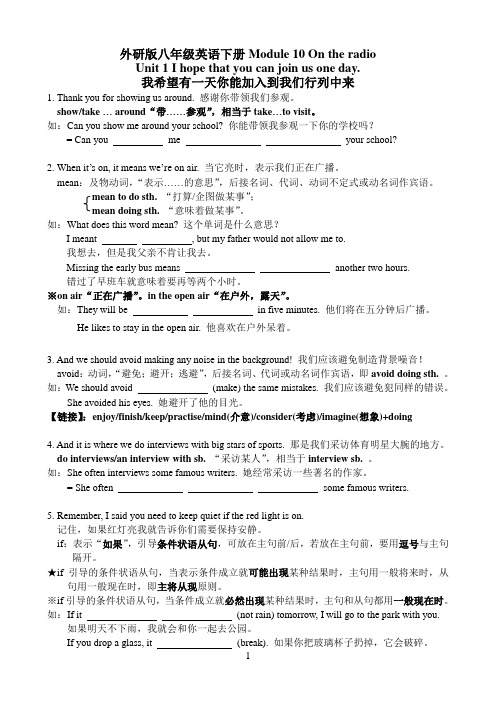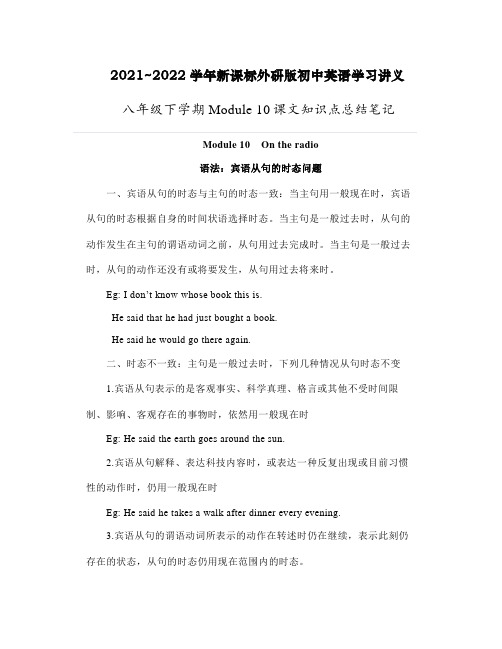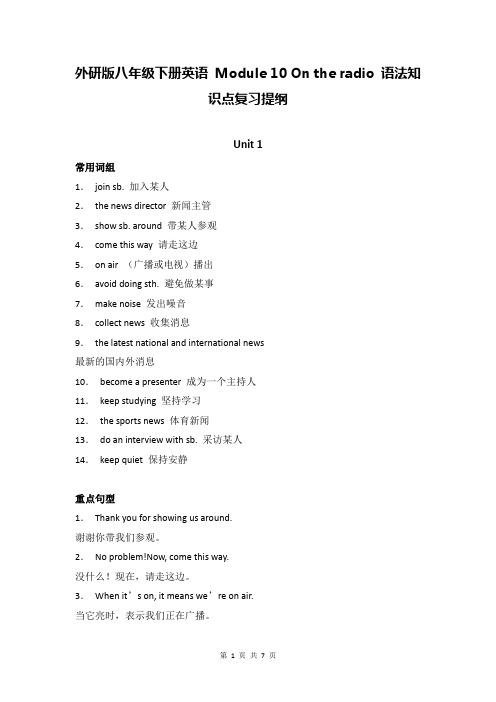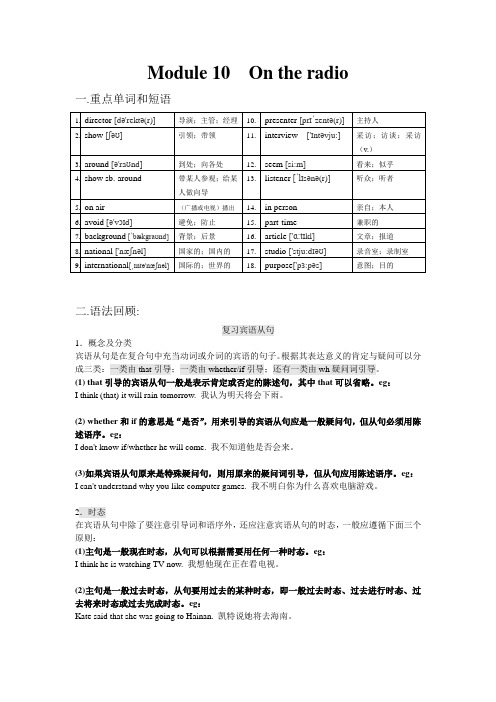外研版八年级下册M10 重点(单词和语法及小练笔)
外研版八年级下册Module 10重难点梳理

Module 10 On the radio必背短语1. show sb. around 带某人参观2. avoid doing sth 避免做某事3. get crazy 变得疯狂4. join us 加入我们5. do interviews with sb. 采访某人6. on air (广播或电视)播出7. ask for 请求,要求8. at the age of 在...岁时9. look down at 低头看10.do research 做研究11. by doing sth 通过做某事12. turn on 打开13. once a week 一周一次14. look out of the window 向窗外看15. in person 亲自16. for breakfast 作为早餐必背用法1. 1) take / show sb. around sp.= take sb. to visit sp. 带某人参观某地Can you take / show us around Tianjin? = Can you take us to visit Tianjin?2) visit the Summer Palace 参观颐和园on a visit to 参观……visit my grandparents 看望我的爷爷奶奶3)travel to Shanghai 到北京去旅行space travel 太空旅行2. 1) be on 开着的、这着的,表状态。
We need to keep quiet if the red light is on.2) on 播出on air on the news3.1) do/ have an interview with sb. = interview sb. 采访某人It is where we do interviews with the big sports stars.2) give an interview (to sb). 接受(……的)采访4. look down at sth.:低头看/俯视某物 look up at sth.抬头看/仰视某物look down on / upon sb看不起某人5.1) sat close to the radio, listening to my favourite programmes and to the voices ofmy favourite presenters. 句法分析:现在分词listening 作状语表示伴随情况2) We prepared a programme once a week, doing research on articles现在分词短语在句中作伴随状语,表示伴随的动作。
外研版八年级英语下册Module 10 On the radio 知识点汇总及练习附答案

外研版八年级英语下册Module 10 On the radioUnit 1 I hope that you can join us one day.我希望有一天你能加入到我们行列中来1. Thank you for showing us around. 感谢你带领我们参观。
show/take … around“带……参观”,相当于take…to visit。
如:Can you show me around your school? 你能带领我参观一下你的学校吗?= Can you me your school?2. When it’s on, it means we’re on air. 当它亮时,表示我们正在广播。
mean:及物动词,“表示……的意思”,后接名词、代词、动词不定式或动名词作宾语。
mean to do sth. “打算/企图做某事”;mean doing sth. “意味着做某事”。
如:What does this word mean? 这个单词是什么意思?I meant , but my father would not allow me to.我想去,但是我父亲不肯让我去。
Missing the early bus means another two hours.错过了早班车就意味着要再等两个小时。
※on air“正在广播”。
in the open air“在户外,露天”。
如:They will be in five minutes. 他们将在五分钟后广播。
He likes to stay in the open air. 他喜欢在户外呆着。
3. And we should avoid making any noise in the background! 我们应该避免制造背景噪音!avoid:动词,“避免;避开;逃避”,后接名词、代词或动名词作宾语,即avoid doing sth. 。
Module 10课文知识点总结(含语法)-外研版八年级下册英语

2021~2022学年新课标外研版初中英语学习讲义八年级下学期Module 10课文知识点总结笔记Module 10 On the radio语法:宾语从句的时态问题一、宾语从句的时态与主句的时态一致:当主句用一般现在时,宾语从句的时态根据自身的时间状语选择时态。
当主句是一般过去时,从句的动作发生在主句的谓语动词之前,从句用过去完成时。
当主句是一般过去时,从句的动作还没有或将要发生,从句用过去将来时。
Eg: I don’t know whose book this is.He said that he had just bought a book.He said he would go there again.二、时态不一致:主句是一般过去时,下列几种情况从句时态不变1.宾语从句表示的是客观事实、科学真理、格言或其他不受时间限制、影响、客观存在的事物时,依然用一般现在时Eg: He said the earth goes around the sun.2.宾语从句解释、表达科技内容时,或表达一种反复出现或目前习惯性的动作时,仍用一般现在时Eg: He said he takes a walk after dinner every evening.3.宾语从句的谓语动词所表示的动作在转述时仍在继续,表示此刻仍存在的状态,从句的时态仍用现在范围内的时态。
Eg: She told me the other day that she is only eight.4.从句中有具体的时间状语,动作是发生在主句动作之前,仍用一般过去时,不改为过去完成时Eg: He said that he was born in 1998.1.Thank you for… = Thanks for + 名词、代词、动词ing因…而感谢2.show… around = take… around= take… to visit带…参观Eg: Can you show/ take us around your factory?= Can you take us to visit your factory?e this way 这边请4.be on (灯等)亮;(电影等)上映5.mean to do sth. 想或企图做某事mean doing sth. 意味着做某事mean (v.)--- meaning (n.) 意思Eg: I had meant to visit you, but I was too busy.My new job will mean travelling all over the world.6.on air 正在广播Eg: We will be on air in ten minutes.7.avoid doing sth. 避免做某事avoid 后接名词、代词或动名词Eg: You should avoid making the same mistakes.avoid (v.) 回避;避开Eg: Everyone seemed to be avoiding him.avoid(v.) 逃避Eg: You should avoid over-spending.8.make some noise 制造噪音9.the latest national and international news 最新的国内、国际新闻10.get crazy 令人发狂be crazy about…热衷于;迷恋于like crazy 发狂似的;极度地go crazy变得疯狂drive sb. crazy 让某人疯狂11.keep doing sth. 不断做某事12.do interview with sb.= interview sb. 采访某人interview --- interviewer 采访者/ interviewee被采访者13.keep quiet 保持安静14.if (1) “如果”引导条件状语从句,如果放在主句前,从句要用逗号与主句隔开Eg: I won’t go by plane if it rains tomorrow.If you want to go, please tell me.(2)if所引导的条件句,要遵循“主将从现”原则Eg: If it doesn’t rain tomorrow, we’ll go to the Great Wall.(3) if引导的条件句,当条件成立必然有某种结果时,主句和从句用一般现在时Eg: If you drop a glass, it breaks.(4)if “是否”时,不用主将从现Eg: I don’t know if it will rain tomorrow.15.against (prep.) “以…为竞争对手;与…对抗”后接名词、代词、动词ingEg: Yesterday we played against a very strong team and we won.反对;对抗Eg: My father is against my plan.16.t he end of……的尾声at the end of…在…末端by the end of…直到…为止in the end 最后;最终1.look down at…低下头看look down upon 瞧不起2.Shouldn’t you be at school?你不用上学吗?这是一个否定疑问句,用于表示惊奇。
最新-八年级英语下册 Module10知识点总结与练习 外研版 精品

八年级下册Module10知识点总结与练习(无答案)1.stay/ be /keep in touch with sb 与某人保持联系。
2.(1)so + 助动词/ 情态动词/be动词+主语,此结构用于肯定句后,此倒装句表示前句中的情况也适用于后句;若前句是否定句,则用neither/nor构成倒装句;倒装句中的动词要和前句的动词相统一。
Eg,he can swim;so can I;他会游泳,我也会;Eg,he doesn’t like dumplings;neither/nor do I;(2)so + 主语+助动词/ 情态动词/be动词,此结构表示对前句陈述的内容加以肯定。
Eg,lucy is a lovely girl;so she is;的确是。
(3)I do so. 我就这样做了。
3.although与but在英语里不能同时出现。
4.so…that…& such…that…(如此…以至于…,引导结果状语从句)之间的区别;以及so 和such之间的区别。
(分为后面跟可数名词单数,可数名词复数以及不可数名词两种情况)5.would you like 后跟两种不同情况时的肯定回答和否定回答;6.on business 出差7.be full of== be filled with 充满;be crowded with挤满;be covered with覆盖满;fill …with…用…把…装满;8.enough放在名词的前面,形容词和副词的后面;9.everything,anything,everyone,somebody,someone等这些不定代词作主语时,谓语动词用单数;10.as…as和...一样,中间接形容词或副词原级,用于同级的两个事物相比较,肯定式为as…as;否定式为:not as/so…a s,表示前者不如后者。
Eg, this film is not so interesting as that one.11.like的两种用法(喜欢,像);as的用法(像,作为,一边);12.in one’s opinion 以某人的观点看13.manage to do sth 成功做成某事14.refer to 提到,参考,指…而言;15.a two-year-old boy;a eight-year-old boy;16.what to do 和 how to do it,可以在句中作宾语,也可以作主语或表语;eg,I don’t know which to buy;17.as soon as;if,when,until 如果主句是将来时的时候,所引导的状语从句用一般现在时代替将来时;即主将从现;18.provide sth for sb== provide sb with sth 为某人提供某物;19.see off sb 送别;若sb是代词时,必须要放在其中间;20.be made from; be made of; be made in; be made by;之间的区别;专项练习:1.______they may not succeed, they will try their best. A though B when C becauseD unless2.we arrived ______late that there were no seats left. A much B too C so Dvery3.our country is becoming richer and stronger. ______. A so it is B so is itC it is so4.his father likes going hiking. ______.A so does his motherB so is his motherC so his mother isD so his mother does5.it was ______weather that they decided to go out for a picnic. A such fine Bsuch a fine C so fine D so fine a6.----could you please te ll me ______in today’s newspaper?---- sorry, ______.A something special; special nothingB special something; special nothingC anything special; something specialD something special; nothing special7.----I think science is more useful than art.---- I disagree. I think art is ______ science.A not so useful asB less useful thanC as useful as8.it is five years since we began to enjoy a ______spring holiday each year.A ten-dayB ten dayC ten day’sD ten-days9.the teacher has already told me but I am still not clear ______to do next.A howB whatC whyD whether10. she was very excited and her eyes were ______tears. A full with B filled ofC full of11.I don’t know ______.A how to doB how to do itC what to do itD how do it.12.since June 1st,2018, all the supermarkets have ______free plastic bags.A to stop to provideB to stop providingC stopped to provideD stopped providing13.although there was too much trouble, we managed ______there. A getting B toget C get D got14.he went to the station to ______. A see off her B see her through C see throughoff D see her off15.don’t worry. He is ______to look after your baby.A carefully enoughB enough carefulC careful enoughD enough carefully.16.he was ______a clever boy ______he can work out the maths problem.A too; toB so; thatC such; thatD enough; that17.______she was ill, she still work hard. A because B although C but D so18.the door is not ______for the elephant to pass.A wide enoughB enough wideC widely enoughD enough widely19.it was ______music that I lost myself in it.A such a beautifulB so beautiful aC so beautifulD such beautiful20.the red suitcase costs more because it ______leather.A makes ofB made ofC is made ofD is making of21.the question is ______that nobody can answer it.A very hardB too difficultC strange enoughD so strange22.we don’t have much homework now and our school bags are ______they used to be.A as heavy asB not as heavy asC as heavily asD not as heavily as23.there are so many kinds of MP5 in the shop. We can’t decide ______.A what to buyB to buy whatC which to buyD how to buy24.----have you got ______ready for the sports meeting? ---- not yet. We still have______ to do.A anything; nothingB something; everythingC everything; something25.mom and dad are ______movie lovers. They have many hobbies in common. A bothB neitherC either26.“can you hear me?”“no, I can’t. would you please speak ______?”A clearly enoughB clear enoughC enough clearD enough clearly27.---- my parents never stop going on about (唠叨) how I should study hard. ----______.A so my parents doB nor my parents doC nor do my parentsD so do my parents28.there is so much nice food. I really can’t decide ______first.A where to eatB how to eatC when t eatD what to eat29.let’s make a cake ______ some flour, butter and milk. A at B of C in Dwith30.______ she is only 8 years old, she knows more about English than her mother.A butB thoughC soD because31.---- may I have another cake?---- you’d better not. You shouldn’t go swimming on a ______stomach.A hotB hungryC fatD full32.my deskmate helps me to learn English ______I can pass the English test nextweek.A so thatB soC becauseD before33.“was the boy saved?”“no, the doctors tried their best, ______they failed.”A andB soC butD until34.“would you like to come to the party tonight?”“yes, ______. ”A I would beB I likeC I doD I’d like to。
外研社版英语八年级下册M1-M10重点词组和句型精编

外研社版英语八年级下册各模块重点词组和句型精编Module 1 Feelings and impressionsⅠ. 重点词组:1.taste good 尝起来不错2.on top 在顶上3.try a piece 尝一块4.smell fresh 闻起来很新鲜5. a bit 有点儿6.be done 完成了;被做7.have a try 试一试8.in the middle 在中间9.have a sweet tooth 喜欢甜食10.be sure that + 句子确定,确信;be sure of/about 确定;be sure to do sth.一定/务必做某事11.hear from sb.= get/receive a letter from sb. 收到某人的来信12.c an’t wait to do sth. 迫不及待做某事;[区分]can’t help doing sth. 意思是禁不住做某事。
13.arrive at/in + 小/大地点= get to + 某地= reach + 某地到达某地14.each other = one another 互相,彼此15.as well 也,又16.love doing sth. 热爱做某事17.be proud of = take pride in 因……而骄傲18.be good at = do well in 擅长19.at school 在学校(上学)20.feel nervous 感到紧张21.in a few days 几天以后22.be afraid of sth/doing sth. 害怕做某事;be afraid to do sth. 害怕/不敢做某事。
23.be excited about/at sth. 对某事感到激动(about后既可以接something,也可接doingsomething;如强调“听到”某事而激动用介词at)24.look like 看起来像25.shake hands with sb. 与某人握手26.at the party 在聚会上27.someone else 别的人28.be open about 对……坦诚/敞开心扉Ⅱ. 重点句型:1.Would you like to try some? 你想尝点吗?2.It looks lovely, and smells delicious. 它看起来很可爱,闻起来很香。
外研版八年级下册英语 Module 10 On the radio 语法知识点复习提纲

外研版八年级下册英语Module 10 On the radio 语法知识点复习提纲Unit 1常用词组1.join sb. 加入某人2.the news director 新闻主管3.show sb. around 带某人参观4.come this way 请走这边5.on air (广播或电视)播出6.avoid doing sth. 避免做某事7.make noise 发出噪音8.collect news 收集消息9.the latest national and international news最新的国内外消息10.become a presenter 成为一个主持人11.keep studying 坚持学习12.the sports news 体育新闻13.do an interview with sb. 采访某人14.keep quiet 保持安静重点句型1.Thank you for showing us around.谢谢你带我们参观。
2.No problem!Now, come this way.没什么!现在,请走这边。
3.When it’s on, it means we’re on air.当它亮时,表示我们正在广播。
4.Keep studying, and I hope that you can join us one day.坚持学习,我希望将来有一天你能加入我们。
5.Remember what I said: we need to keep quiet if the red light is on.记住我说的话:如果红灯亮了,我们需要保持安静。
6.That’s great news!那真是好消息!要点精析1. director n. 导演;主管;经理如:He is a great film director.他是一位了不起的电影导演。
其动词形式为direct,意为“指导;导演”。
外研版八年下M10模块重点单词句子

Module 10 单词词组句子
单词
1.导演,主管,经理
2.引领,带领
3.到处,向各处
4.带某人参观,给某人做向导
5. (广播或电视)播出
6. 避免,防止
7. 背景,后景
8. 国家的,国内的
9. 国际的,世界的
10. 主持人
11. 访谈,采访
12. 看来,似乎
13. 听众,听者
14. 亲自,本人
15. 兼职的
16. 文章,报道
17. 录制室,录音室
18.意图,目的
词组
1.避免做某事
2.继续学习
3.采访某人
4.讲话声音大点儿
5.俯视某人
6.研究,探讨某事
7.做声音测试
8.做得好
9.主持节目
10.在电台工作
11. 坚持做某事
Module10 重点句子1.我希望有一天你能加入到我们行列中来。
2.当灯亮时,表示我们正在广播。
3.我们应当避免在背景中制造噪音。
4.节目开始之前,这儿吵得让人发狂
5.那是我们采访体育明星大腕的地方。
6.好像他们在亲自和我说话。
7.随着年龄的增长,我对广播的兴趣与日俱增。
8.我根据观察窗外的情况来做到。
9.只需要告诉我你早餐吃了什么。
10.目的是要检查音质水平。
外研社八年级英语下册 Module 10 重点知识、语法练习题(有答案)

Module 10 On the radio一.重点单词和短语二.语法回顾:复习宾语从句1.概念及分类宾语从句是在复合句中充当动词或介词的宾语的句子。
根据其表达意义的肯定与疑问可以分成三类:一类由that引导;一类由whether/if引导;还有一类由wh疑问词引导。
(1) that引导的宾语从句一般是表示肯定或否定的陈述句,其中that可以省略。
eg:I think (that) it will rain tomorrow. 我认为明天将会下雨。
(2) whether和if的意思是“是否”,用来引导的宾语从句应是一般疑问句,但从句必须用陈述语序。
eg:I don't know if/whether he will come. 我不知道他是否会来。
(3)如果宾语从句原来是特殊疑问句,则用原来的疑问词引导,但从句应用陈述语序。
eg:I can't understand why you like computer games. 我不明白你为什么喜欢电脑游戏。
2.时态在宾语从句中除了要注意引导词和语序外,还应注意宾语从句的时态,一般应遵循下面三个原则:(1)主句是一般现在时态,从句可以根据需要用任何一种时态。
eg:I think he is watching TV now. 我想他现在正在看电视。
(2)主句是一般过去时态,从句要用过去的某种时态,即一般过去时态、过去进行时态、过去将来时态或过去完成时态。
eg:Kate said that she was going to Hainan. 凯特说她将去海南。
(3)当从句表示客观事实、普遍真理和自然现象时,不管主句是什么时态,从句一律用一般现在时态。
eg:My teacher told us that the earth goes around the sun. 我的老师告诉我们地球绕着太阳转。
3.语序宾语从句用陈述句语序。
eg:Does he like Times English Post?Do you know?他喜欢《时代英语报》吗?你知道吗?→Do you know if/whether he likes Times English Post?你知道他是否喜欢《时代英语报》吗?三.语法操练一、单项选择。
- 1、下载文档前请自行甄别文档内容的完整性,平台不提供额外的编辑、内容补充、找答案等附加服务。
- 2、"仅部分预览"的文档,不可在线预览部分如存在完整性等问题,可反馈申请退款(可完整预览的文档不适用该条件!)。
- 3、如文档侵犯您的权益,请联系客服反馈,我们会尽快为您处理(人工客服工作时间:9:00-18:30)。
Module 10 My perfect holidayperfect adj. 完美的,理想的v. 使完美,提高反义词:imperfect adj.有缺点的Practice makes perfect.熟能生巧。
I want to have a perfect holiday.= I _____ _____ _____ have a perfect holiday._____________________________________(你想提高你的口语水平么?) Get到达_____________________ get off获得礼物____________________ take offTurn off see offSet off__________________________________________(他们买了什么给sally 吃.) Flight航班fly 飞;放(风筝)Go to someplace. by plane = ________________ = ________________Go to someplace by train=___________________His _________ left three minutes ago.He _________ to Chongqing just now to have a meeting.So + 谓语+ 主语so + 主语+ 谓语She had short hair. ___________________(我也是)She was doing her homework. ___________________( 他们也是)___________________( 我也是)She has been to the city twice. ____________________(他也是)___________________( 他们也是)You’re Canadian. ___________________(我也是)____________________(他也是)___________________( 他们也是)She’d like to have a party. _________________( 我也是)She can play piano. ___________________( 我也是)She had short hair. ___________________(确实如此)She was doing her homework. ___________________(确实如此)___________________(确实如此)She has been to the city twice. ____________________(确实如此)___________________(确实如此)She’d like to have a party. _________________(确实如此)She can play piano. ___________________(确实如此)Who jumps the farthest? --Jim ____________.Who will see the patient(病人)?-- David _____________.Have a …… time尽管很累,但是我们过得很开心。
(though)尽管天气很糟糕,我们度过了很棒的一段时光。
(in spite of )Meet遇见;会见meeting会议I’m glad ___________(meet) you.I ______(meet) my manager in the supermarket when I bought some vegetables. There _______ (be)some water and vegetables.There are going to ___________(有) some film stars at the station.There will _________(有) some concerts next month.There ________ a book and two boxes on the table.would 的几种常见用法1. would 是will 的过去式。
1) would do是过去将来时的句子结构,一般它只用在从句当中。
如:Li Ming said that he would be a doctor in the future.李明说他将来要作医生。
2)would like to do= I want to do我想和你一起去英国。
你想和我一起去所有那些城市去吃所有喜欢的食物吗?2.would还可以用来表达对未来的想像。
如:I would have two wings and then fly to the moon.我想有对翅膀飞到月亮上。
I would receive a lot of presents on my birthday.我想生日时收到很多礼物。
Afraid害怕的scared frightened我害怕我们的数学老师。
________________________________________________我害怕在公开场合演讲。
_________________________________________________恐怕明天我没有时间去那个大型户外流行音乐会。
__________________________________________________Something would go wrong with the plane.=_____________________________________________silly adj. 傻里傻气的Don't be silly, that insect can't hurt you.stupid意思最强,指智力、理解力和学习能力差;silly指头脑简单,傻头傻脑;foolish用的最普遍board登机CA937航班正在登机。
___________________________________________ abroad国外他去国外学习一些基本的技能。
__________________________________________ Fill with be filled with=be full offill(v.),装满,填满filled ,filledfull(adj.),满的",反义词是empty; "饱的",反义词是hungry。
车上挤满了人。
_______________________________________________用纸把箱子塞满。
_________________________________________________ empty adj.空的v.清空,倒空反义词:full adj.满的The house is empty, no one is living there.这座房子是空的,没有人住。
Jane, please empty the dustbin.burn v. 烧,烧焦,燃烧过去_______________________burn down把......烧成平地;burn out熄灭,浇灭burn soupenough adj.足够的,充足的Enough is as good as a feast.(谚)足食犹如筵席/知足常乐。
1)enough作形容词修饰名词时一般放在名词前。
I don’t have enough money to buy this house.=I can’t afford the house.2)enough后面接动词,要用不定式形式。
3)enough修饰形容词放在形容词后面。
I don’t have _______ ________ _______ _________ ________ __________.我没有足够的时间去度假。
She is not ______ _______ _______ _______ ________.他不够自立,不能一个人生活。
what to do和how to look after ourselves “疑问词+不定式”结构Can you tell me how to get to the bus station? (作宾语)你能告诉我怎么到公交车站吗?Whether to go there by air depends on the weather. (作主语)是否坐飞机去依天气而定。
The problem is where to hold the meeting. (作表语)问题是到哪儿举办会议。
I have no idea which book to read first. (作同位语)我不知道先读哪本书。
the 13-year-old boya 20 -metre-long river a 20- metre-high buildingHe is ninteen years old. 他今年5岁。
The river is twenty metres wide. 这条河20米宽。
living adj.生活的He is the greatest writer living today.他是当今在世的最伟大的作家。
Living conditions have improved here.这里的生活条件已得到改善。
make a living谋生living condition生活条件living room起居室simple adj. 简单的反义词为complex "复杂的"。
过着简单的生活____________________如此简单的一个问题_______________________________manage v.设法做到;管理manager经理manage to do sth.意为"设法做某事,并已经完成",表示经过努力达到目的。
try to do sth.努力做某事,不包含是否成功的意思。
manage a business经商manage a factory开办一家工厂那个10岁的小孩设法煮出美味的番茄蛋花汤。
_____________________________________________________________他设法帮助家里。
